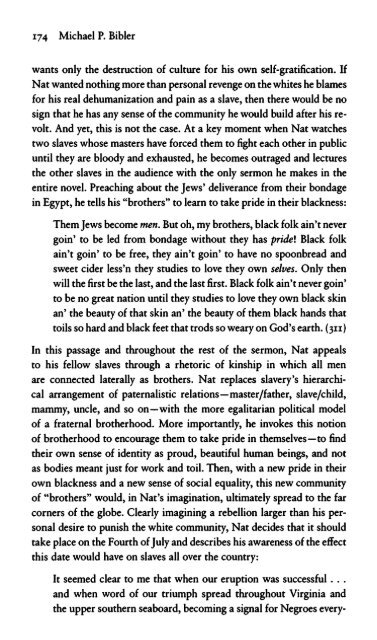Perversion the Social Relation
Perversion the Social Relation
Perversion the Social Relation
- No tags were found...
Create successful ePaper yourself
Turn your PDF publications into a flip-book with our unique Google optimized e-Paper software.
174 Michael P. Biblerwants only <strong>the</strong> destruction of culture for his own self-gratification. IfNat wanted nothing more than personal revenge on <strong>the</strong> whites he blamesfor his real dehumanization and pain as a slave, <strong>the</strong>n <strong>the</strong>re would be nosign that he has any sense of <strong>the</strong> community he would build after his revolt.And yet, this is not <strong>the</strong> case. At a key moment when Nat watchestwo slaves whose masters have forced <strong>the</strong>m to fight each o<strong>the</strong>r in publicuntil <strong>the</strong>y are bloody and exhausted, he becomes outraged and lectures<strong>the</strong> o<strong>the</strong>r slaves in <strong>the</strong> audience with <strong>the</strong> only sermon he makes in <strong>the</strong>entire novel. Preaching about <strong>the</strong> Jews' deliverance from <strong>the</strong>ir bondagein Egypt, he tells his "bro<strong>the</strong>rs" to learn to take pride in <strong>the</strong>ir blackness:Them Jews become men. But oh, my bro<strong>the</strong>rs, black folk ain't nevergoin' to be led from bondage without <strong>the</strong>y has pridel Black folkain't goin' to be free, <strong>the</strong>y ain't goin' to have no spoonbread andsweet cider less'n <strong>the</strong>y studies to love <strong>the</strong>y own selves. Only <strong>the</strong>nwill <strong>the</strong> firstbe <strong>the</strong> last, and <strong>the</strong> last first. Black folk ain't never goin'to be no great nation until <strong>the</strong>y studies to love <strong>the</strong>y own black skinan' <strong>the</strong> beauty of that skin an' <strong>the</strong> beauty of <strong>the</strong>m black hands thattoils so hard and black feet that trods so weary on God's earth. (311)In this passage and throughout <strong>the</strong> rest of <strong>the</strong> sermon, Nat appealsto his fellow slaves through a rhetoric of kinship in which all menare connected laterally as bro<strong>the</strong>rs. Nat replaces slavery's hierarchicalarrangement of paternalistic relations—master/fa<strong>the</strong>r, slave/child,mammy, uncle, and so on—with <strong>the</strong> more egalitarian political modelof a fraternal bro<strong>the</strong>rhood. More importantly, he invokes this notionof bro<strong>the</strong>rhood to encourage <strong>the</strong>m to take pride in <strong>the</strong>mselves—to find<strong>the</strong>ir own sense of identity as proud, beautiful human beings, and notas bodies meant just for work and toil. Then, with a new pride in <strong>the</strong>irown blackness and a new sense of social equality, this new communityof "bro<strong>the</strong>rs" would, in Nat's imagination, ultimately spread to <strong>the</strong> farcorners of <strong>the</strong> globe. Clearly imagining a rebellion larger than his personaldesire to punish <strong>the</strong> white community, Nat decides that it shouldtake place on <strong>the</strong> Fourth of July and describes his awareness of <strong>the</strong> effectthis date would have on slaves all over <strong>the</strong> country:It seemed clear to me that when our eruption was successful. . .and when word of our triumph spread throughout Virginia and<strong>the</strong> upper sou<strong>the</strong>rn seaboard, becoming a signal for Negroes every-








